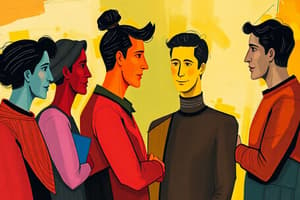Podcast
Questions and Answers
What was the downside of higher group cohesion in the Julian, bishop & Fiedler Army training study?
What was the downside of higher group cohesion in the Julian, bishop & Fiedler Army training study?
- Better adjustment to civilian life
- Decreased identification with the army
- Lowered morale due to frequent and continuous failure (correct)
- Improved satisfaction with training
In Turner's group cohesion experiment with schoolgirls, what happened to the cohesion of highly committed groups when they lost?
In Turner's group cohesion experiment with schoolgirls, what happened to the cohesion of highly committed groups when they lost?
- Increased (correct)
- Became erratic
- Decreased
- Remained the same
According to Roy's 'Banana time' case study, what was the impact of higher cohesion on member satisfaction and productivity?
According to Roy's 'Banana time' case study, what was the impact of higher cohesion on member satisfaction and productivity?
- Lower member satisfaction and lower productivity
- Higher member satisfaction and lower productivity (correct)
- Higher member satisfaction and higher productivity
- Lower member satisfaction and higher productivity
What was the key difference in how highly committed groups and low-commitment groups reacted to losing in Turner's experiment?
What was the key difference in how highly committed groups and low-commitment groups reacted to losing in Turner's experiment?
What did Julian, bishop & Fiedler suggest was needed to improve morale in army training?
What did Julian, bishop & Fiedler suggest was needed to improve morale in army training?
What was the main finding of Aronson & Mills' study on hazing with female students?
What was the main finding of Aronson & Mills' study on hazing with female students?
What did participants who went through a severe initiation and experienced cognitive dissonance tend to do in terms of rating the group?
What did participants who went through a severe initiation and experienced cognitive dissonance tend to do in terms of rating the group?
What did Sherif's autokinetic effect studies reveal about grouped participants?
What did Sherif's autokinetic effect studies reveal about grouped participants?
In the Bennington College Study (1943), what general trend was observed in students' political attitudes over time at the liberal college?
In the Bennington College Study (1943), what general trend was observed in students' political attitudes over time at the liberal college?
What behavior did the Bavelas Study demonstrate could be increased through encouragement in groups?
What behavior did the Bavelas Study demonstrate could be increased through encouragement in groups?
According to the Ohio State Leadership Studies, what are the two important dimensions of leadership behavior?
According to the Ohio State Leadership Studies, what are the two important dimensions of leadership behavior?
What did Fiedler's studies on leadership, conducted over 15 years with 1600 groups, focus on?
What did Fiedler's studies on leadership, conducted over 15 years with 1600 groups, focus on?
Flashcards are hidden until you start studying
Study Notes
Cognitive Dissonance and Group Ratings
- Participants who undergo severe initiations rate the group more favorably to eliminate cognitive dissonance
- Supports Festinger's theory of cognitive dissonance
Sherif's Autokinetic Effect Studies
- Participants in groups adjusted their personal judgments to the group norm, even if it was less accurate to their own beliefs
- Group members converged to a norm after 90 trials
- Removal of group members doesn't change the norm, but new members added create a new norm influenced by the previous one
- Old norms persist for approximately 5-6 generations
The Bennington College Study
- Students' political attitudes became more liberal the longer they spent at the university
- More liberal students looked up to faculty and student leaders (referent group influence)
- Students' popularity/status increased when they followed the norms
- Conservative students were more socially isolated and identified with family and friends back home
- Views taken on during college were long-lasting
Bavelas Study on Leadership
- People can be encouraged to take initiative and speak up more in a group through encouragement
- Encouragement continued to increase perceived leadership ability in subsequent sessions
- Shows that leadership can be learned and trained
Ohio State Leadership Studies
- Two important dimensions of leadership: task orientation and relationship orientation (support for two-factor theory of leadership)
- Best leaders show both task and relationship behaviors
Fiedler's Studies on Leadership
- Leaders chosen based on competence, legitimate process, strong group identification, conforming to norms, and fair conflict procedures
- Higher group cohesion results in higher morale, stronger group identification, better adjustment to army life, and higher satisfaction with training
Turner's Group Cohesion Experiment
- Highly committed groups had greater cohesion when they lost, but low-commitment groups' cohesion declined when they lost
- Highly committed groups were more determined to do better next time
Roy's "Banana Time" Case Study
- Higher cohesion led to higher member satisfaction, but lower productivity
- Hazing (initiation rituals) in groups can lead to increased cohesion and member satisfaction
Studying That Suits You
Use AI to generate personalized quizzes and flashcards to suit your learning preferences.




